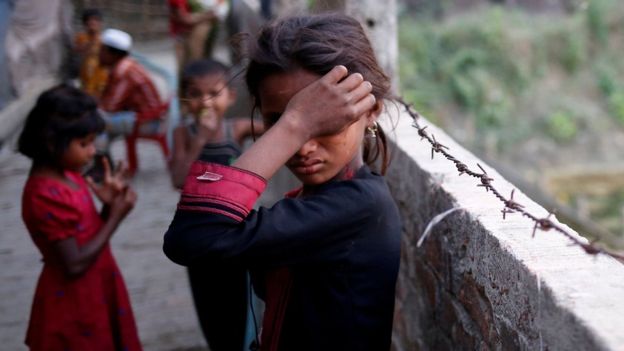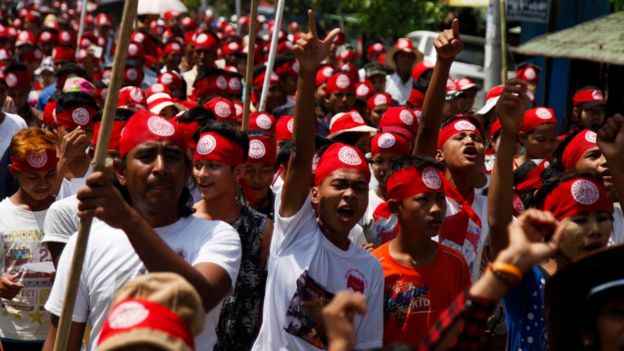[Nobel Peace Laureate] Aung San Suu Kyi: No Ethnic Cleansing of Myanmar Muslim Minority
NOBEL LAUREATES, 10 Apr 2017
BBC News Asia – TRANSCEND Media Service
The leader of Myanmar, formerly known as Burma, has given a wide ranging interview to the BBC’s Fergal Keane:
httpv://www.youtube.com/watch?v=MFEEmdKbqBE
Aung San Suu Kyi has denied there is ethnic cleansing of the Rohingya Muslim minority in Myanmar, despite widespread reports of abuses.
6 Apr 2017 – In an exclusive interview with the BBC, the Nobel peace prize winner acknowledged problems in Rakhine state, where most Rohingya people live.
But she said ethnic cleansing was “too strong” a term to use.
Instead, Myanmar’s de-facto leader said the country would welcome any returning Rohingya with open arms.
“I don’t think there is ethnic cleansing going on. I think ethnic cleansing is too strong an expression to use for what is happening,” she told the BBC’s special correspondent Fergal Keane.
Ms Suu Kyi added: “I think there is a lot of hostility there – it is Muslims killing Muslims as well, if they think they are co-operating with the authorities.
“It is not just a matter of ethnic cleansing as you put it – it is a matter of people on different sides of the divide, and this divide we are trying to close up.”
The Rohingya are denied citizenship in Myanmar, also known as Burma, which views them as illegal immigrants from Bangladesh. They face routine official and public discrimination.
Tens of thousands of Rohingya live in make-shift refugee camps after being displaced by communal violence in 2012.
In recent months, some 70,000 have fled to Bangladesh to escape a government military operation in Rakhine, launched after nine policemen were killed in an attack.
The United Nations announced last month it was to conduct an investigation into allegations the military has been indiscriminately targeting the Rohingya during the operation, subjecting them to rape, murder and torture. The government has denied this.
For many, Ms Suu Kyi’s perceived silence on the Rohingya has damaged the reputation she earned as a beacon for human rights, thanks to her decades-long battle against the military junta, during much of which she was under house arrest.
She has come under increasing pressure internationally on the issue.
But speaking in a face-to-face interview for the first time this year, Ms Suu Kyi said she had answered questions on the issue previously.
“This question has been asked since 2013, when the last round of troubles broke out in Rakhine.
“And they [the journalists] would ask me questions and I would answer them and people would say I said nothing.
“Simply because I did not make the statements people wanted, which people wanted me to make, simply to condemn one community or the other.”
Ms Suu Kyi said she had no idea why the October attacks were carried out, but speculated it may have been an effort to derail attempts to negotiate peace between the Myanmar state and the country’s various armed ethnic insurgent groups.
She also denied the army had free rein to do whatever it liked.
“They are not free to rape, pillage and torture,” she said. “They are free to go in and fight. That is in the constitution. Military matters are to be left to the army.”
However, she did acknowledge that regaining control of the military was something the government still hoped to do. Under the current constitution, the military operates independently of the governing party.
******************************
From icon to politician: Fergal Keane, BBC News in Myanmar
I meet her in Nay Pyi Daw, a relic of the absurdity and paranoia of military rule, a capital marooned far from the people, designed to keep the generals safe but where the new democratic government is now trying to consolidate a hold on power.
I first interviewed Aung San Suu Kyi more than two decades ago on her release from the first period of house arrest in July 1995. Since then I have followed her progress through renewed house arrest, military crackdowns and then the triumph of democratic elections last year.
The atmosphere when we met was friendly. She discussed her government’s achievements but refused absolutely to accept that the Rohingya Muslims in Rakhine state were the victims of ethnic cleansing.
These days she is wary of the international media, disdainful of her international critics, far more the steely politician than the global icon feted from capital to capital when she was released seven years ago.
*****************************
Ms Suu Kyi also defended the progress her government had made since sweeping to power in March last year.
The number one priority – creating jobs – had been helped by investment into roads, bridges and bringing electricity to communities. Healthcare has also improved, and more free elections have been held.
Other priorities included creating a peace in a country which has almost continuously been in a state of civil war.
And then there was discussion of giving citizenship to those who had been denied it under the military junta – like the Rohingya.
As for those Rohingya who have fled Myanmar to neighbouring countries, Ms Suu Kyi said: “If they come back they will be safe. It is up for them to decide, some have come back.
“We welcome them and we will welcome them back.”
____________________________________
More:
- Hounded and ridiculed for complaining of rape
- Truth, lies and Aung San Suu Kyi
- Who are the Rohingya?
- Rohingya villages ‘destroyed’ in Myanmar
DISCLAIMER: The statements, views and opinions expressed in pieces republished here are solely those of the authors and do not necessarily represent those of TMS. In accordance with title 17 U.S.C. section 107, this material is distributed without profit to those who have expressed a prior interest in receiving the included information for research and educational purposes. TMS has no affiliation whatsoever with the originator of this article nor is TMS endorsed or sponsored by the originator. “GO TO ORIGINAL” links are provided as a convenience to our readers and allow for verification of authenticity. However, as originating pages are often updated by their originating host sites, the versions posted may not match the versions our readers view when clicking the “GO TO ORIGINAL” links. This site contains copyrighted material the use of which has not always been specifically authorized by the copyright owner. We are making such material available in our efforts to advance understanding of environmental, political, human rights, economic, democracy, scientific, and social justice issues, etc. We believe this constitutes a ‘fair use’ of any such copyrighted material as provided for in section 107 of the US Copyright Law. In accordance with Title 17 U.S.C. Section 107, the material on this site is distributed without profit to those who have expressed a prior interest in receiving the included information for research and educational purposes. For more information go to: http://www.law.cornell.edu/uscode/17/107.shtml. If you wish to use copyrighted material from this site for purposes of your own that go beyond ‘fair use’, you must obtain permission from the copyright owner.


Aung San Suu Kyi says that there is no ethnic cleansing in cleansing in Myanmar.
Radovan Karadzic says there was no ethnic cleansing in Bosnia. : https://www.theguardian.com/world/2014/oct/01/radovan-karadzic-war-crimes-trial-no-ethnic-cleansing-bosnia
Peter Galbraith says there was no ethnic cleansing (during the Operation Storm) in Croatia. : http://www.sense-agency.com/icty/galbraith-authorities-ordered-or-approved-crimes.29.html?cat_id=1&news_id=8353
Benny Morris says that there was no ethnic cleansing in Israel in 1948. : http://mondoweiss.net/2016/10/cleansing-becomes-israeli/
How Israel aims to redefine ‘ethnic cleansing’ : http://www.aljazeera.com/news/2016/09/israel-aims-redefine-ethnic-cleansing-160912083447943.html
Salva Kiir says that there is no ethnic cleansing in South Sudan. : http://www.reuters.com/article/us-southsudan-un-idUSKBN13Q4SU
List of ethnic cleansing campaigns : https://en.m.wikipedia.org/wiki/List_of_ethnic_cleansing_campaigns